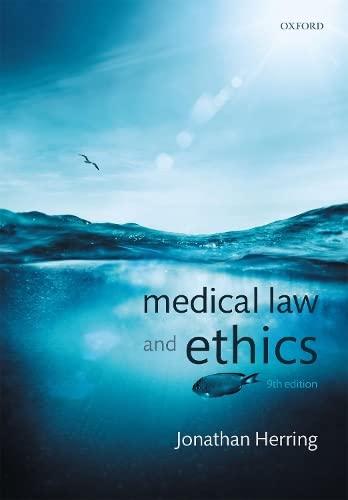Question
Mr Flowers and Ms Finnegan worked with Allied Security Services Limited (ASSL) in your jurisdiction. Mr Flowers had worked for ASSL as a security guard
Mr Flowers and Ms Finnegan worked with Allied Security Services Limited (ASSL) in your jurisdiction. Mr Flowers had worked for ASSL as a security guard for 17 years and Ms Flowers for just under two years. They had both been required to sign ASSL's standard operative contracts. The contract specified that were self-employed contractors providing services to ASSL.
The contract stated that security guards could do whatever work they wished, refuse any offers of work, choose their hours and method of work, and stated there was no mutuality of obligations between the parties. The contract also provides that guards can organize their own substitute with similar experience and qualifications to carry out their work. Due to security and health and safety concerns this has never been used and ASSL will just usually move around guards to pick up the slack. Security guards were never paid sick pay or holiday pay and paid national insurance on a self-employed basis. Guards were allowed to take on other private work with private establishments. Guards occasionally did this in the times they were not working at an ASSL property mainly on weekends. Guards must first liaise with management, in order to know which property, they will be working at. They would attend meetings once a month with ASSL representative to be updated of changes in schedules. There was a sheet for contractors which identifies risks on the various places and precautions to minimise risk. They were told which places to go and what instructions came from the client or owner of the place. They would be provided initially with a uniform and baton at first but money would be deducted from their fee for replacements. If there were issues between the clients and the guards, ASSL would move the guards around to another site. If a guard kept refusing to go sites, they were rostered for less hours. The rate of pay for each hour was negotiated by each guard but it usually was determined by the company based on years of experience and no one received less than $3USD the national minimum wage and no more than $5USD an hour.
Due to the economic downturn in your country ASSL has had less work and has no work for half of the security guards. Mr Flowers and Ms Finnegan were subsequently both dismissed without notice and brought claims in the Employment Tribunal/Court as employees.
You are the Judicial Research Counsel advise the Tribunal on whether Mr Flowers and Ms Finnegan are employees or independent contracts, what are the implications for same and if the contract is enforceable.
Step by Step Solution
There are 3 Steps involved in it
Step: 1

Get Instant Access to Expert-Tailored Solutions
See step-by-step solutions with expert insights and AI powered tools for academic success
Step: 2

Step: 3

Ace Your Homework with AI
Get the answers you need in no time with our AI-driven, step-by-step assistance
Get Started


